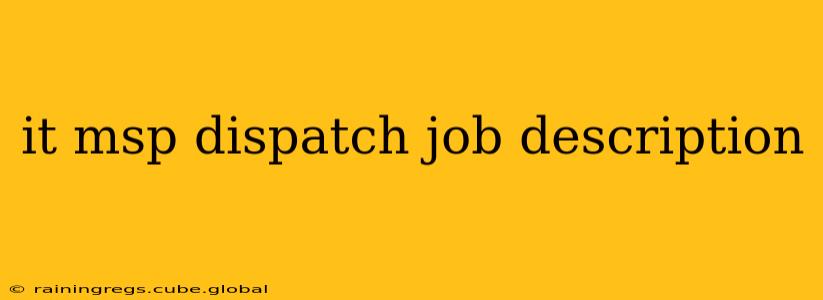The IT Managed Service Provider (MSP) landscape is dynamic and demanding. At its core lies the dispatch team, responsible for the smooth and efficient allocation of technicians to client projects. This job description outlines the key responsibilities, skills, and qualifications for a successful IT MSP Dispatch professional. This role is crucial for maintaining client satisfaction and ensuring the profitability of the MSP.
Key Responsibilities of an IT MSP Dispatcher
-
Ticket Prioritization and Assignment: This is the bread and butter of the role. You'll receive incoming tickets, assess their urgency and complexity, and assign them to the most appropriate technician based on skillset, availability, and geographic location. This requires strong judgment and an understanding of IT service level agreements (SLAs).
-
Technician Scheduling and Dispatch: Effectively managing technician schedules is paramount. You'll coordinate appointments, ensure technicians have the necessary information (client details, access credentials, specific problem descriptions), and track their progress throughout the day.
-
Communication is Key: You'll be the primary point of contact for both technicians and clients. Clear and timely communication is essential, keeping everyone informed of updates, delays, or changes in schedules. This includes updating ticketing systems accurately and promptly.
-
Resource Management: You'll monitor technician workload and availability to ensure optimal resource allocation. This may involve proactively identifying potential bottlenecks and re-assigning tasks to maintain efficiency.
-
Problem Solving and Troubleshooting (basic): While not a technical role, you'll need basic IT troubleshooting skills to quickly understand the nature of issues and assign them correctly. Being able to quickly diagnose a simple problem saves time and resources.
-
Reporting and Data Analysis: You'll generate reports on key performance indicators (KPIs) such as technician utilization, ticket resolution times, and client satisfaction. This data helps improve operational efficiency.
-
Inventory Management (sometimes): Depending on the MSP's size and structure, you may be involved in managing inventory of parts or equipment needed by technicians for on-site repairs or installations.
Skills and Qualifications
-
Excellent Communication Skills: Both written and verbal communication is critical for this role, interacting with diverse personalities.
-
Strong Organizational Skills: Managing multiple tasks and priorities simultaneously requires excellent organization and time management skills.
-
Proficiency in Ticketing Systems: Experience with common ticketing systems (e.g., ConnectWise, Autotask, ServiceNow) is essential.
-
Technical Aptitude: While not requiring deep technical expertise, a basic understanding of IT concepts and terminology is necessary to effectively understand and manage tickets.
-
Problem-Solving Skills: Quickly assessing situations and making informed decisions is crucial for efficient dispatching.
-
Attention to Detail: Accuracy in assigning tickets and managing schedules is vital to avoid delays and errors.
Frequently Asked Questions (FAQs)
What are the typical working hours for an IT MSP dispatcher?
Working hours can vary depending on the MSP and client needs, but often involve covering business hours and potentially some on-call support.
What software or tools do IT MSP dispatchers typically use?
Common tools include ticketing systems (ConnectWise, Autotask, ServiceNow), mapping software (Google Maps), and potentially internal communication platforms (Slack, Microsoft Teams).
What are the career advancement opportunities for an IT MSP dispatcher?
With experience, dispatchers can move into roles such as team lead, service desk manager, or even into more technical roles within the MSP.
What is the salary range for an IT MSP dispatcher?
Salary varies by location, experience, and company size, but generally falls within a competitive range for administrative/support roles.
What is the difference between an IT MSP dispatcher and a help desk agent?
While both roles are involved in resolving IT issues, the dispatcher focuses primarily on allocating resources and managing workflows, while help desk agents directly interact with clients to troubleshoot issues.
This job description provides a comprehensive overview of the IT MSP dispatcher role. The specific requirements may vary slightly depending on the size and structure of the MSP. The ideal candidate will be a highly organized, detail-oriented individual with excellent communication and problem-solving skills.
